The COVID-19 pandemic and government-mandated shutdowns have triggered a wave of business interruption lawsuits. At the heart of these disputes are sympathetic business owners who have been required to sacrifice company operations to protect the publics’ health. While the business owners clearly have experienced “business interruptions,” whether there is coverage is an open question. Many insurance policies require “physical loss or damage to property,” and some policies also include a “virus” exclusion. The stakes are high, with both policyholders and insurers asserting that their financial viability and survival are on the line.
This wave of litigation is in its early days and it remains unclear whether jurors will ultimately be asked to make coverage determinations. Nevertheless, there is value in exploring potential jurors’ attitudes toward insurance and insurance companies early in the litigation, and in discovering how they interpret specific language regarding business interruption coverage in the context of the COVID-19 pandemic. In general, early focus group research provides trial teams with strategic insights that enable them to frame their cases in discovery.
To that end IMS conducted in-depth focus group research on community attitudes toward COVID-19 and emergent litigation arising from the 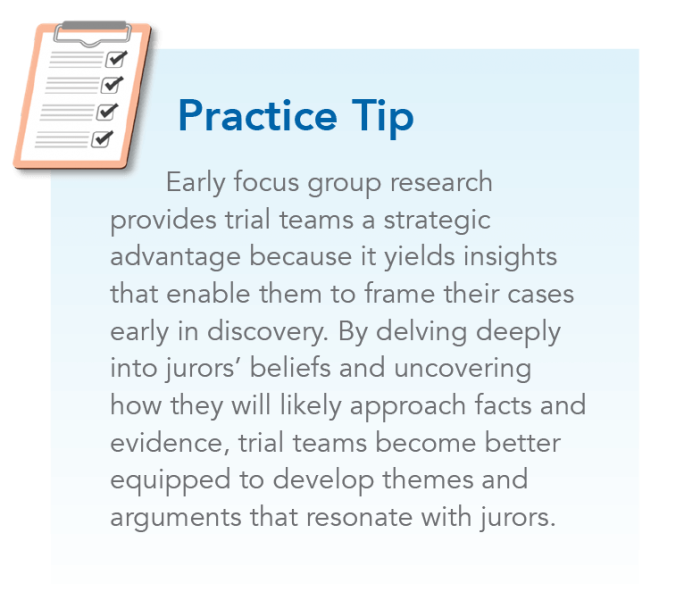 pandemic, with a focus on insurance issues and business interruption claims. We conducted twelve virtual focus groups with jury eligible residents in Los Angeles, Houston, and New York City. Each focus group session lasted five hours, and we spoke with eighty-two participants in total.
pandemic, with a focus on insurance issues and business interruption claims. We conducted twelve virtual focus groups with jury eligible residents in Los Angeles, Houston, and New York City. Each focus group session lasted five hours, and we spoke with eighty-two participants in total.
Based on this extensive focus group research, this article first discusses the impact the pandemic has had on potential jurors and how this may shape their decision-making. Second, we turn to jurors’ perceptions of insurance and insurance companies. Finally, we analyze how focus group participants viewed ambiguity in policy language and how they evaluated simple case scenarios involving business interruption disputes.
COVID-19 Impacts on Potential Jurors
Wide-ranging measures to stop the spread of COVID-19 have altered how we work, socialize, and learn, and have led to massive economic disruption. The attitudes and experiences that can shape juror decision making – including perceptions of risk, trust in experts, economic vulnerability, views of government and governmental agencies, importance of insurance and a safety net, acceptance of scientific evidence, and expectations for corporate behavior – are shifting. Decision-makers in cases, whether they be judges or jurors, will have been personally affected by the pandemic in ways that may shape how they evaluate and weigh themes, arguments, and evidence.
The participants in our focus groups were substantially impacted by the pandemic—many were financially vulnerable and nearly everyone was concerned for the future:

-
As a result of the pandemic, nearly a third of the participants applied for unemployment benefits, and forty-one percent indicated they had difficulty paying bills.
-
Generally, people were worried about job loss. For instance, 38% indicated they were very or quite worried about either losing their job or their spouse losing their job, and over half felt as though they would be looking for a job within the next year.
-
Ninety-six percent were worried the country would enter a severe recession.
Against this backdrop of financial hardship and concern for the future, over three quarters of participants thought the government, in general, was not doing enough to help those most impacted by the pandemic.
This social context may increase pro-social attitudes and the desire to help plaintiffs adversely affected by the pandemic in some jurors. Indeed, a recent research study found that reflecting on the pandemic causally increased people’s sense of solidarity and fairness. The potential for the pandemic context to increase sympathy and shape jurors’ decision-making should be addressed in both jury selection and trial strategy.
Jurors’ Views about Insurance and Insurance Companies
What Is Insurance?
Most research participants conceived of insurance in terms of its purpose: to protect someone when something bad happens, particularly, from an event that was outside of their control.
“But if you're being forced to close down, and you've got to have that compensation somewhere because it's out of your control, that's generally why we have insurance, for things that are out of our control.” —John, Houston
It is not surprising that jurors define insurance as providing help in times of need. This lay understanding of insurance is entirely consistent with insurance marketing that uses trust-based appeals and evokes peace of mind. Jingles and marketing messages that personify insurance companies as trusted friends and good neighbors imply the insured will be protected or taken care of when he or she needs help.
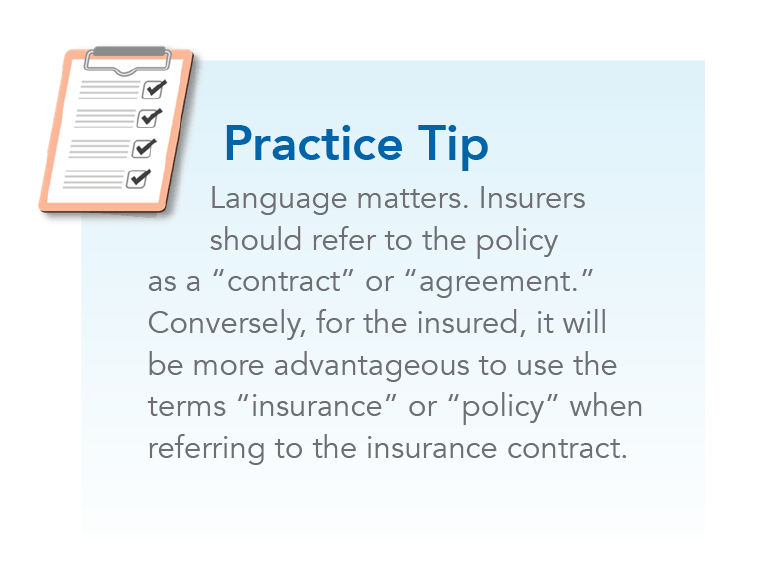
In contrast to this practical understanding of insurance as a helper, is the technical view of insurance as a contractual transfer of risk. Yet, most mock jurors did not view insurance as a contract in the first instance. There is a fundamental disconnect between insurance as a safety net and insurance as a contract that transfers risk only under certain circumstances, leading to the perception that insurance companies often fail to live up to their promises.
Furthermore, most participants only had personal experiences with boilerplate auto, home, or health insurance policies. Very few had experience negotiating policies with specific riders and exclusions. Focus group participants experienced insurance as just another variety of product or service available for purchase.
Understanding this disjuncture between potential jurors’ own experiences and beliefs and case facts can help counsel speak into those beliefs and/or reframe them as necessary. Likewise, this helps illuminate how to educate jurors effectively in a complex coverage dispute. On the policyholder side there is benefit in paying deference to jurors’ typical conception of insurance, while the insurer may want to educate jurors about what insurance means from a business perspective.
Jurors’ Perceptions of Insurance Companies
It will come as no surprise that most potential jurors in our focus group research held negative perceptions toward insurance companies.
-
Eighty-six percent agreed insurance companies intentionally make their policy language confusing and/or ambiguous so as to create “loopholes” that will enable them to deny coverage.
-
Seventy-five percent agreed insurance companies regularly try to deny claims.
Some jurors believed that denying claims is core to the insurance business model. In essence, they defined the insurance industry’s business model as something akin to bad faith.
“I think it's hard to have a lot of faith in a system that makes its money primarily from denying you. I don't think that's the greatest of systems.” —Laurie, Los Angeles
“I've been in the situation where if you have an insurance claim you have to fight it tooth and nail just to get the claim to go through. That's how they make their money and they make good money doing it.” —Donald, Houston

Attitudes and beliefs about insurance companies were consistently negative across venues. The most notable difference was the degree of experience jurors had with insurance in the different locales. Participants in Houston had more experience with home and flood insurance, and their attitudes about insurance were slightly more negative. Direct experience with insurance companies was more limited in NYC as many potential jurors did not own major assets such as homes or cars. Jurors in all venues had more experience with health insurance than with any other type of insurance, and health insurance was a shared lens through which they interpreted insurance companies more broadly
Interpreting Business Interruption Coverage in the Pandemic Context
A central but often overlooked facet of how jurors interpret policy terms includes their shared beliefs about language and how it works. These language beliefs are usually implicit and taken for granted, yet they are central to jurors’ decision-making in coverage disputes and other types of contract disputes. Understanding and tapping into the language beliefs that jurors bring to their interpretations of contracts can help trial teams develop more effective case themes and strategies for any disputes in which contract terms are central to the case.
In discussing insurance and business interruption claims stemming from the pandemic, potential jurors coalesced around the following themes: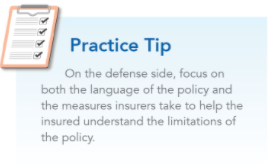
-
Contract language should be clear and to the point.
-
Ambiguous contract language is open to interpretation.
-
The parties are bound to the terms of the contracts they sign.
-
The burden of understanding lies with both parties—the insurer has a duty to explain and the policyholder has a duty to ask.
Of course, general beliefs about language can differ amongst jurors, and the same juror can hold competing beliefs in different contexts, or at different moments. The variability of these beliefs about language and how it should work offers opportunities for persuasion. In the following subsections, we discuss how the assumptions, beliefs, and moral evaluations shaped the potential jurors’ interpretations of a business interruption coverage dispute.
Policy Language Is Confusing by Design
Potential jurors found insurance policy language extremely difficult, if not impossible, to understand. To the extent that participants had read their own policies, they struggled to understand them. Many participants believed that, in order to understand insurance policies and to ensure their interests are covered, policyholders need to be lawyers (or they need to hire lawyers). The challenge of fully understanding policy terms contributed to a broad consensus that insurance companies have the upper hand.
Potential jurors expressed well-developed ideas about the ways that insurance companies intentionally confuse policyholders. They said insurance companies did so through use of:
-
Legalese
-
Fine print or small print
-
Burying of important points
-
Double talk
-
Run on sentences
Participants generally agreed that the insurer benefited from a policyholders’ lack of understanding.
“Especially with insurance, there seems to be more small print than there is big print, and the small print will get you. And like I said, when there's more exclusions and limitations than there are benefits to the policyholder, that's a big red flag right there. And it's unfortunate, but they know you're going to need some sort of insurance and...they are going to prey on that. And then a lot of you are going to get the short end of the stick.” —Devin, Los Angeles
“[Insurance companies] make it so it’s almost a certainty that, unless you’re a lawyer and know how to decipher that document, you’ll never know what you actually have coverage for. And it almost seems like there's a willful intent to bury stuff like that in a 30-page legal document, so that they purposefully, in my opinion, make it so you don't see it, and they don't go out of their way to bring it to your attention.... And so if you sign up a policyholder and bury all these things into a legalese document, if it's all of these that a layman wouldn't understand what's covered and what's not, then to me that's willful intent on the part of the insurance company to deceive the business as to what they were actually going to be receiving or not receiving.” —Abraham, New York
“I have a reasonably average IQ, and when I read the policies and things, there's so much double talk and run-on sentences and that type of thing, until you kind of get tired of reading it before you get done. And you would think that if they were on the up and up, that they would write these particular contracts in layman's terms, as opposed to the legalese, so that we can understand what we're getting.” —Thurgood, Los Angeles
Ambiguity Leaves Room for Creative Interpretation
In coverage disputes, jurors will undoubtedly be confronted with a policy that they find confusing and ambiguous, and many may hold the use of abstruse language against the insurer. This perception will be supported in many jurisdictions by the legal doctrine that ambiguous contract language should be interpreted against the drafting party.
Many participants were sympathetic to business owners, particularly small business owners who might not have the resources to fight a battle over the meaning of a policy’s terminology.
“That's the wording that the lawyers are going to put in there. So, depending on how far you want to dig, it's going to be what your lawyer can interpret versus what their lawyer's going to interpret. A lot of insurance is really the interpretation of the word, like what ‘is,’ is. It's going to be up for interpretation. So, if you've got the ability to do that, then that's a fight you can win. Is that most business operators that are small? No. That's really going to be the hard part.” —John, Houston
In a dispute over business interruption coverage, some participants were motivated to find coverage for the insured, and they strove to develop creative interpretations of policy language that granted them that coverage. When discussing various potential policies, participants focused on interpreting the terms “physical loss or damage.” Some reasoned that since both the terms “physical loss” and “physical damage” were used, there must be a distinction between them.
“But I still look at that as a loss because they're losing business, they're losing money.” —Julie, Houston
“I guess the policy says physical, but you can also argue what physical damage even means.” —Alana, Los Angeles
These participants’ lay interpretations were remarkably similar to various legal theories asserted in these cases and even to recent judicial decisions. In a recent decision, a judge in Federal District Court for the Western District of Missouri denied an insurer’s motion to dismiss and found “physical loss” and “physical damage” were not synonymous. Because “physical loss” and “physical damage” were undefined in the policy, the court relied on Merriam-Webster to define physical loss as “the act of losing possession” and “deprivation.” Some participants used similar reasoning in an effort to find coverage.
“If the governor said this particular business is not allowed to open, and they have a brick and mortar location, then the governor just deemed that building unsafe. So, if I had a good lawyer, they would argue it from that direction and hopefully come up with a compromise.” —Ron, Los Angeles
“Something that occurred to me is that, just within the confines of the physical, so, if the government now says, ‘Okay, you can only have a quarter of your tables. You can only have half of your tables,’ is that not physical that now half of your tables, your money or earning physical capacity is limited? So, just in that respect, I think, obviously, there's a lot more leeway in the policy as to the meaning of physical. If you have a good lawyer, they'll go in and make an argument for you. There's room to wiggle, I guess.” —Monica, Los Angeles
The Limits of Interpretation: We Are Bound by the Terms of the Contract
Although some potential jurors sought creative interpretations of policy language to benefit policyholders, most also recognized that there were limits to how open they could be with their interpretations. They placed obligations regarding a policy’s terms and coverage on both parties. Understanding was viewed as a shared responsibility, with an insurer having an obligation to clearly inform about terms and the insured, a responsibility to ask. Some participants emphasized the insurer’s duty, while others focused on the policyholder’s duty. Yet, most agreed that a policyholder is bound by the contract they signed, even if a policyholder did not fully understand his or her coverage.
“I don't think that [insurance companies] go to enough trouble to make sure that the people that are buying the insurance actually understand everything that they're getting or not getting....they have so many pages and so many words and so much legalese, if you will, that it's difficult for the average guy to understand what they're getting in the first place.” —Thurgood, Los Angeles
“I think it's only fair that the insurance [companies] should definitely thoroughly explain to a consumer the different options.” —Maya, Houston
“[I]f we're buying something that's specific, so to speak, [insurance companies] should take a little bit more time to explain it to us because we're not lawyers.... So everything gets buried, because why? They benefit; we small business owners don't.” —Sid, New York
Others emphasized the policyholder’s responsibility:
“[Y]ou should [not] get a pass just because you don't know. That's why you should educate yourself. And if you are starting a business, you should be way proactive on making sure you have everything tied up to where it's secure. You should have understood your policy, and if you don't understand it, ask questions.” —Donald, Houston
“You have to really get into the weeds of your policy, and you're going to have to ask lots of questions. And that's the only way to do it.” —Devin, Los Angeles
Participants made a distinction between a business interruption policy that had a specific virus exclusion and a policy that just required “physical loss or damage” without such an exclusion. For most participants, a specific virus exclusion was viewed as unfortunate for the policyholder because the exclusion was clear cut and not readily open for interpretation in the policyholder’s favor. On the other hand, the very existence of virus exclusions implied that a business interruption policy without one could potentially cover pandemic-related business shutdowns because otherwise the exclusion would be unnecessary.
Likewise, when participants learned that it was possible to purchase pandemic coverage, that led many of them to conclude that the standard business interruption policy, unfortunately, does not cover pandemics and COVID-19 losses.
“It’s very unfortunate. It really is. I mean, it sucks honestly. And lot of people who are going to be stuck out there because they didn't buy extra pandemic coverage.” —Alisha, Houston
Share the Pain: Expectations for Company Conduct During the Pandemic
The unprecedented nature of the pandemic provided important context for participants as they grappled with questions about business interruption coverage. First, many participants felt badly for policyholders who paid premiums for years but were then denied coverage in their time of need. This outcome was in conflict with participants’ basic understanding of the promise and purpose of insurance. Second, the focus group participants were sympathetic to the fact that policyholders’ business losses stemmed directly from the pandemic and the policyholders made sacrifices for the greater public good, sacrifices similar to ones the participants themselves made in their own lives.
In our discussions, many participants shared the viewpoint that the pandemic was producing a few winners and lots of losers. They seemed to hold a heightened concern for the most vulnerable. 
-
Seventy-six percent thought the government, in general, was not doing enough to aid those most impacted by COVID-19.
-
Ninety-three percent agreed with the statement, “Small businesses should be compensated for damages the COVID-19 pandemic has caused.”
-
Yet, the size of the business mattered. Only 47% agreed that “large businesses should be compensated for damages the COVID-19 pandemic has caused.” However, at trial even a relatively large company can take the “little guy” role in a coverage dispute with an insurance company.
Many participants wanted insurance companies to “share the pain,” and they expressed their desire for a just outcome. Indeed, all but one participant (97%) agreed with the statement, “In a crisis, insurance companies should interpret policies broadly so as to take care of policyholders.” Their notions about whether a policy was being interpreted broadly or was being interpreted outside the bounds of the contract varied.
“[T]hey should interpret this insurance policy a little broadly, given that these are exceptional times. These are unprecedented times... This is something that we've never dealt with before, individually or globally. So it's a learning experience for everybody on every level. And I think, just as to show good faith, to show that we are cared for by businesses and government and everything, that an exception should be made.” —Christopher, Houston
“Right, I would hope that in good faith that the insurance company would set aside maybe like a separate fund for these businesses to access, sort of like the federal government did with the PUA. Because they're paying that much monthly, they should be entitled to some sort of payment to help.” —Sal, Los Angeles
“I also feel like this pandemic should be a loophole...they know you can't foresee the unforeseeable. So it shouldn't be the policyholder’s fault. The insurance companies should really make an exception.” —Avni, New York
While some participants recognized that their desired outcome would not necessarily happen, they pointed to o ther pandemic interventions, such as government mandated eviction freezes, as precedent.
ther pandemic interventions, such as government mandated eviction freezes, as precedent.
Well, I think that the insurance companies, the same way that they've got all this coverage for rents and mortgages and different stuff, like that where the government has come in and said, ‘You can't evict anybody during this’ and that kind of thing, there ought to be something that the insurance companies have to deal with too. I can't say what that would be, but I think that there should be something. Because if a landlord has got to not collect rent until this thing is over, then the insurance companies ought to have to pitch in and do their part too.” —Edward, Los Angeles
Finding pandemic precedent in other industries indicates a significant new form of reasoning that jurors could use in a variety of creative ways and should be considered carefully.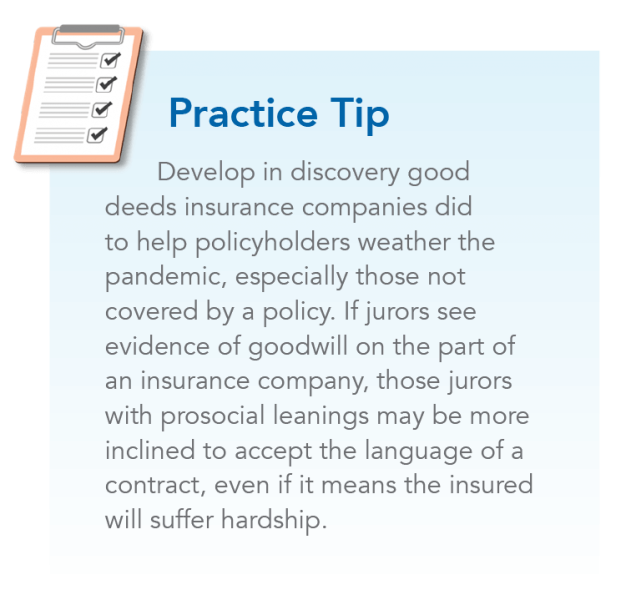
Many focus group participants wanted corporations to at a minimum do a little extra for customers during the pandemic, for instance, to extend a refund instead of a credit, even if a refund was not legally required. Some participants mentioned receiving auto insurance rebates for driving less during the shutdowns. This was a positive example of the small deeds many wanted to see more corporations performing during these unprecedented times.
Potential jurors’ attitudes and experiences will likely render them inclined to find that an insured is covered when the language of the policy is ambiguous. Contract law in most states will support that interpretation as well. Most jurors take jury duty very seriously, so despite their desires for certain outcomes, they will follow the law to the best of their ability, albeit sometimes in creative ways. Yet, a few participants candidly revealed to us that they would look outside the contract to achieve the outcome that they believed to be just. Therefore, in business interruption cases, it is possible that we will see explicitly outcome-driven verdicts.
“From a moral point of view, the business owner does have something coming. And if he doesn't get it from the courts, if I'm on a jury, and he can't get it anywhere else but from me, I'm going to give it to them.” —Thurgood, Los Angeles
“The other question would be if we're actually in a courtroom, are we sticking to our guns...and I got to be honest, in that scenario, I'm sitting in the jury room, I'll always side with that business owner, even though I know that the true facts of the law don't really side with them.” —Edward, Los Angeles
Conclusion
As the COVID-19 pandemic continues to unfold, no one knows how long everyday life will be altered, nor the duration and permanence of the economic repercussions. Nevertheless, as cases proceed forward, it will be important to assess if and how to modify strategies, themes, and arguments to appeal to jurors in this new pandemic world. In this circumstance jury research is more important than ever.
For more highlights from our COVID-19 Research Insights series, findings from jury research and litigation trend analysis, and recommendations for your practice, visit our COVID-19 Client Resource Hub. Contact us today to discuss the specific needs of your case.



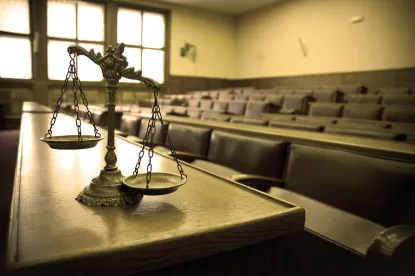
 />i
/>i

